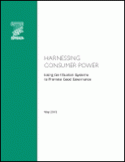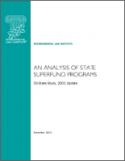
Research Reports
ELI publishes Research Reports available for free download that present the analysis and conclusions of the policy studies ELI undertakes to improve environmental law and policy. These reports contribute to education of the profession and disseminate diverse points of view and opinions to stimulate a robust and creative exchange of ideas. Those publications, which express opinions of the authors and not necessarily those of the Institute, its Board of Directors, or funding organizations, exemplify ELI’s commitment to dialogue with all sectors.
Harnessing Consumer Power: Using Certification Systems to Promote Good Governance explores how certification mechanisms that have been used previously to promote environmental and social sustainability can be applied to advance transparent and democratic government processes, reduce corruption, and promote peace. Certification systems may be designed to directly cut off major sources of revenue for armed conflict or to indirectly improve environmental and social sustainability such as ecotourism certification. Highlighting the current international certification systems for
Read More >
We need to improve the effectiveness of conservation investments by federal, state, and local governments. The Smart Links concept links conservation funding with techniques to promote smarter growth and compatible development on nearby lands. A Smart Links funding program has two goals:
- to ensure that the public

The New Public: The Globalization of Public Participation, edited by ELI Senior Attorney Carl Bruch, takes a close look at the foundations of public involvement, and regional and international institutions that advance public involvement. The book, whose release coincides with the World Summit on Sustainable Development (WSSD) in Johannesburg, South Africa, highlights cases from Africa, the Americas, Europe, and Asia, illustrating the common need and experiences in promoting a core set of principles for public input in effective decisionmaking.
Read More >
This report examines the cleanup programs of all 50 states, Puerto Rico and the District of Columbia. The Study provides a snapshot of state statutes, program organizations, staffing, funding, expenditures, cleanup standards and activities, brownfields, long-term stewardship and institutional controls.
Read More >